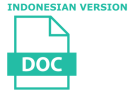Persepsi Mahasiswa PBI terhadap Penerapan Pembelajaran Aktif Menggunakan Model Pembelajaran Kooperatif pada Mata Kuliah Drama, Prose, Poetry
Astry Fajria(1*)
(1) Universitas Ahmad Dahlan
(*) Corresponding Author
Abstract
Literary subjects are usually presented through lecturing the students in the classroom, leading them into a stage of boredom. Conversely, learning method has shifted from teacher-centered to student-centered. This way, active learning becomes necessary. The study aims to know the students’ perception on the use of active learning, especially cooperative learning, in Drama Prose Poetry subject. The research belongs to descriptive qualitative study, using closed and open questionnaires to obtain qualitative and quantitative data. The participants are 83 students taking Drama Prose Poetry subjects in the department of English Education. The results show that more than half of the participants (58 in number) agree to be more active in the classroom. Four types of cooperative learning methods are applied in the study: gallery walk, jigsaw, information gap, and drawing. Among the four activities, most students chose gallery walk as their favorite (53 in number).
Keywords
Full Text:
PDFReferences
Altman, S, et al. (1985). Organizational Behaviour: Theory and Practice. Florida Academic Press, Inc.
Dinata, H. (2017). THE USE OF GALLERY WALK TOO ENHANCE THE SPEAKING ACHIEVEMENT OF THE NINTH GRADE STUDENTS OF SMP PGRI 1 PALEMBANG. Jurnal Global Expert, 6 (1) http://ejournal.uigm.ac.id/index.php/GE/article/view/265
Edel, S, et al. (2015). Pedagogical Pratices-Gallery Walk. https://scholarsphere.psu.edu/downloads/1jw827964s
Ismawati, E. (2013). Pengajaran Sastra. Yogyakarta: Penerbit Ombak.
Novianti, N. (2016). English Literature Teaching: an Indonesian Context. Indonesian Journal of Applied Linguistics 6(1): 42-49. https://ejournal.upi.edu/index.php/IJAL/article/view/2660
Presada, D. (2015). Teaching Literature By Means of Games in Higher Education. Journal Plus Education, Vol XII No. 2 https://www.uav.ro/jour/index.php/jpe/article/view/577
Pittman, M. (2018). How to Use the Jigsaw Strategy with Your Students. https://support.newsela.com/hc/en-us/articles/214902046-How-to-use-the-jigsaw-strategy-with-your-students
Puglionesi, A. (2016). “Drawing as Instrument, Drawings as Evidence: Capturing Mental Processes with Pencil and Paper.” An International Hournal for the History of Medicine and Related Sciences. July: 359-387. Doi: 10.1017/mdh.2016.28
Martaningsih et. al, Sri Tutur. (2015). Modul Pelatihan Active Learning for Higher Education (ALFHE). Yogyakarta.
Riadi, M. (2012, 27 Desember). Pengertian Pembelajaran Aktif. http://www.kajianpustaka.com/2012/12/pembelajaran-aktif.html (diunduh pada 27 Februari, 2016)
Richter, J. (2017, April 30). Information Gap Activity: Definition & Strategy. https://study.com/academy/lesson/information-gap-activity-definition-strategy.html
Şengül, S., and Yasemin, K. (2014). Effects of jigsaw technique on mathematics self-efficacy perceptions of seventh grade primary school students. Procedia-Social and Behavioral Sciences, 116: 333-338. https://doi.org/10.1016/j.sbspro.2014.01.217Triyoga, A. (2015). Persepsi Mahasiswa Kelas Pre-Intermediate Structure PBI UAD Terhadap Penerapan Mobile Learning. Yogyakarta: UAD
Tucker, Lois P. (2000). Liberating Students through Reader-Response Pedagogy in the Introductory Literature Course. Desember 2000, National Council of Teacher of English. TETYC: 199-206.
Victoria and Albert Museum. (2016). What is Drawing? http://www.vam.ac.uk/content/articles/w/what-is-drawing/
British Council. Information Gap. https://www.teachingenglish.org.uk/article/information-gap
Article Metrics
Refbacks
- There are currently no refbacks.
Copyright (c) 2018 The Author(s)

This work is licensed under a Creative Commons Attribution-ShareAlike 4.0 International License.







